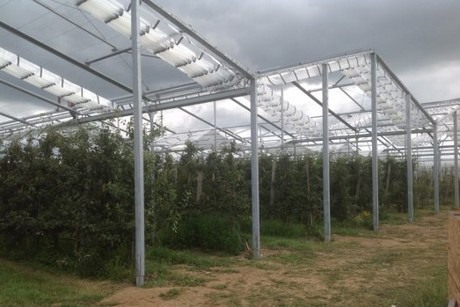What is the best way of protecting apple cultivation from pests and fungal diseases while reducing the use of pesticides as much as possible? Researchers at Wageningen University & Research may have developed an answer for this: the convertible cover, an innovative cover that is deployed when it rains.
The convertible cover is part of a systems innovation in the Groene Gewasbescherming en bestuivers (green crop protection and pollinators) project and was unveiled on Thursday 15 August during the annual open day at the experimental garden Proeftuin Randwijk.

Half of an allotment for growing apples (0.3 hectares) at the experimental garden Proeftuin Randwijk has been fitted with the convertible cover. When it rains, the cover will close which will ensure that the trees stay dry. The cover switches from an open to closed position in two-and-a-half minutes. Researcher Rien van der Maas states: “During cultivation, apples can be exposed to botrytis rot, apple scab and neonectria ditissima each of which can cause significant damage. It may be possible to prevent apples being exposed to them by keeping the trees dry. The convertible cover could also keep a single pest away from the apples trees. For example, we can temporarily close the sides of the allotment to keep out common green capsids. Growers will then not need to use crop protection agents to ensure their crops are free from these fungal diseases and pests.”
Using captured rainwater
The convertible cover is unique in Europe, because the system can be opened and closed. The open system ensures that biological control agents, such as parasitic wasps, can continue to do what they do best. Use of the convertible cover also maximizes environmental pollinators’ capacities.
Van der Maas points out, “In the Netherlands, farmers already use permanent covers when cultivating cherries. But we know from foreign research on apples that woolly apple aphid numbers and prevalence of mildew increase when apples are grown under permanent covers. The roofs of such covers must therefore be open most of the time.”
“A 1,000 m3 storage tank is located next to the cover. The rainwater that lands on the convertible cover is transported via gutters and pipes to the storage tank. We then use the water to irrigate the apple trees through two systems: buried drip irrigation pipes for the grass patches and mini sprinklers for the rows of trees. This ensures that the condition and composition of the soil remains consistent. Rainworms and earwigs will then still be able to do their useful work,” van der Maas explains.
Green crop protection and pollinators
This convertible foil cover is the most important aspect of the innovative “Beschermde Appelteelt” (protected apple cultivation) cultivation system that Wageningen University & Research has been working on since 2018. The cultivation system combines biological crop protection, physical crop protection and targeted capturing of pests such as the apple sawfly. Van der Maas notes, “Our cultivation system is part of a larger research project, financed by the Ministry of Agriculture, Nature and Food Quality. Within the ‘Green crop protection and pollinators’ project, new cultivation systems are being researched that would ensure crops of strawberries, lilies, apples or arable crops are not as dependent on crop protection agents while making sure that growers can maintain their market positions.”
Reduction in use of crop protection agents: between 70 and 90%
At a later stage, the researchers will assess the market positions of the growers that use the convertible cover. The system is currently expensive at approx. €40 per square meter. If it works, Van der Maas expects that there will be suppliers who could produce the cover at a lower cost. Additionally, the convertible cover could provide more benefits to cultivation than keeping the trees dry to prevent diseases.
The researchers are also taking the influence of the convertible cover on landscaping into account through talks with employees of the spatial planning department of the province. This is because the cover will draw attention in farming landscapes. “We have noted that legislation will be introduced concerning the installation of the covers, as happened with hail-proof net systems. This will be accelerated if the results of the research project are positive, for example in relation to biological pollinators. We hypothesize that the use of protected apple cultivation will reduce the use of crop protection agents by 70 to 90%. In this way, we are working towards a shift from crop protection agents towards physical and biological methods to combat pests and fungal diseases.”
For more information:
Wageningen Plant Research
Rien van der Maas
Tel: +31 488473728
www.wur.nl
